Eukwasan.com ads (Free Instructions)
Eukwasan.com ads Removal Guide
What is Eukwasan.com ads?
Eukwasan.com ads often show links to malicious websites
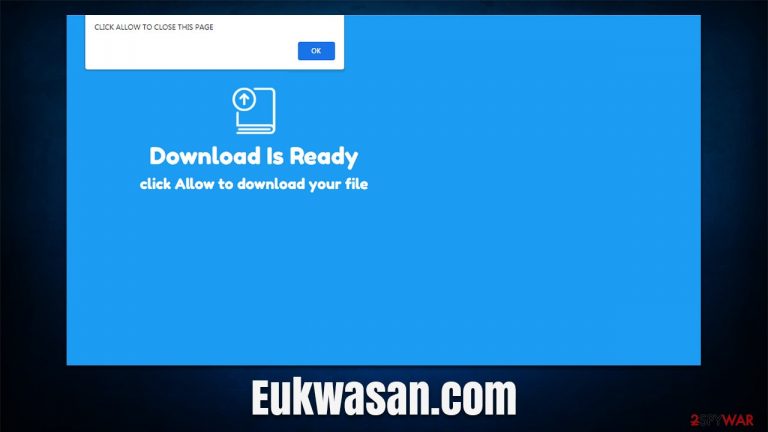
Have you been suffering from Eukwasan.com ads that randomly show up on your screen? Don't worry because there are plenty of other users who experienced the exact same thing. The issues prevail on various platforms, such as Windows, macOS, Android, as well as affect numerous browsers, including Google Chrome, Mozilla Firefox, MS Edge, Safari, and others.
Regardless of whether you are browsing your favorite websites or watching a video, Eukwasan.com pop-ups might show up at any time, as long as the browser is running or idling in the background. Since these push notifications cover all the other running apps, the activity can be particularly intrusive and cause a lot of frustrations to users.
However, the worst part about the whole ordeal is the contents of these prompts. While some notifications can advertise some types of products or even legitimate websites, most ads are something users would rather not see, as the presented content is misleading and sometimes even malicious. For example:
- Get-rich-quick[1] schemes. These scams manifest themselves in telling a fake story of some type of local celebrity who managed to get rich within weeks or even days by investing a small sum to this seemingly amazing offer. This is also followed by fake Facebook messages and fake bank account statements.
- Fake virus infection prompts are very common when it comes to online scams in general. Users are told that their systems have been infected with a virus, that particular software needs to be downloaded to eradicate them, or that an alleged tech support number must be called.
- Links to insecure websites can be of any content, including of sexual nature. In many cases, these websites might not only be offensive to some but also cause security issues.
It is also important to note that redirects to phishing, scam, or similar malicious websites and an increased number of advertisements might be a clear indication of the adware infection, so it is vital to check the system for that as well.
| Name | Eukwasan.com |
| Type | Push notifications, ads, scam |
| Distribution | The entry point is via the notification prompt – users need to press the “Allow” button |
| Symptoms | Intrusive pop-ups show up directly on the screen, covering all the other opened apps or websites |
| Risks | If you click on links provided by the website, you might end up infecting your system with malware/PUPs, disclosing your personal information to cybercriminals, or losing money for useless services |
| Removal | You can stop the unwanted notifications by accessing web browser settings. If you suspect adware infection, you should use SpyHunter 5Combo Cleaner security software to get rid of it |
| Recovery | Potentially unwanted programs often leave traces within web browsers – cookies, for example, are used for tracking. You should get rid of these leftovers with FortectIntego or employ our manual guide |
How push notification scams operate
Overall, the security of the online sphere has been drastically improved over the past two decades – the internet search engines are much more advanced in filtering out the inappropriate or even dangerous results. Likewise, security vendors have been working on new methods on how to catch malware and scams before they manage to harm users with the help of advanced technologies such as machine learning.[2]
However, despite the efforts, plenty of malicious websites intend to scam people in various ways or make them install malware on their devices. Unfortunately, the internet is simply way too vast, so every website and page would be regulated and terminated in time by network providers.
The truth is, Eukwasan.com is just one of the hundreds of thousands of websites created to scam users into subscribing to push notifications. While this scam is nowhere near as dangerous as malicious spam email attachments that carry ransomware[3] payloads, for example, it is still a malicious endeavor that shouldn't be underestimated.
One link click might result in malware infections under certain circumstances, and push notifications from websites like Arriedstro.work, Mydesktopdefence.com, or Yflexibilituky.co can bring plenty of those to your desktop. Thus, it is vital not to click any links provided by it, even if the offer seems attractive.
So, how do these scams work? As we already mentioned, users might get to malicious websites thanks to an adware installed o their systems or by clicking a link on a high-risk website. As soon as they land on Eukwasan.com they see what seems to be a simple prompt which as users press the “Allow” button within it. This is a bad idea though.
Users can often be caught off guard and not consider the possibility that the messages they encounter on the site might be fake, thinking that it is a simple request. For example, they might see the following:
Click Allow if you are not a robot
Since many websites ask users to verify that they are not a robot by either selecting correct images or typing in the captcha code, many might believe that technique here is to press the “Allow” within the prompt. In other cases, users might be promised a video or 18+ content in return. Unfortunately, this action would immediately allow the website to send push notifications without any restrictions.
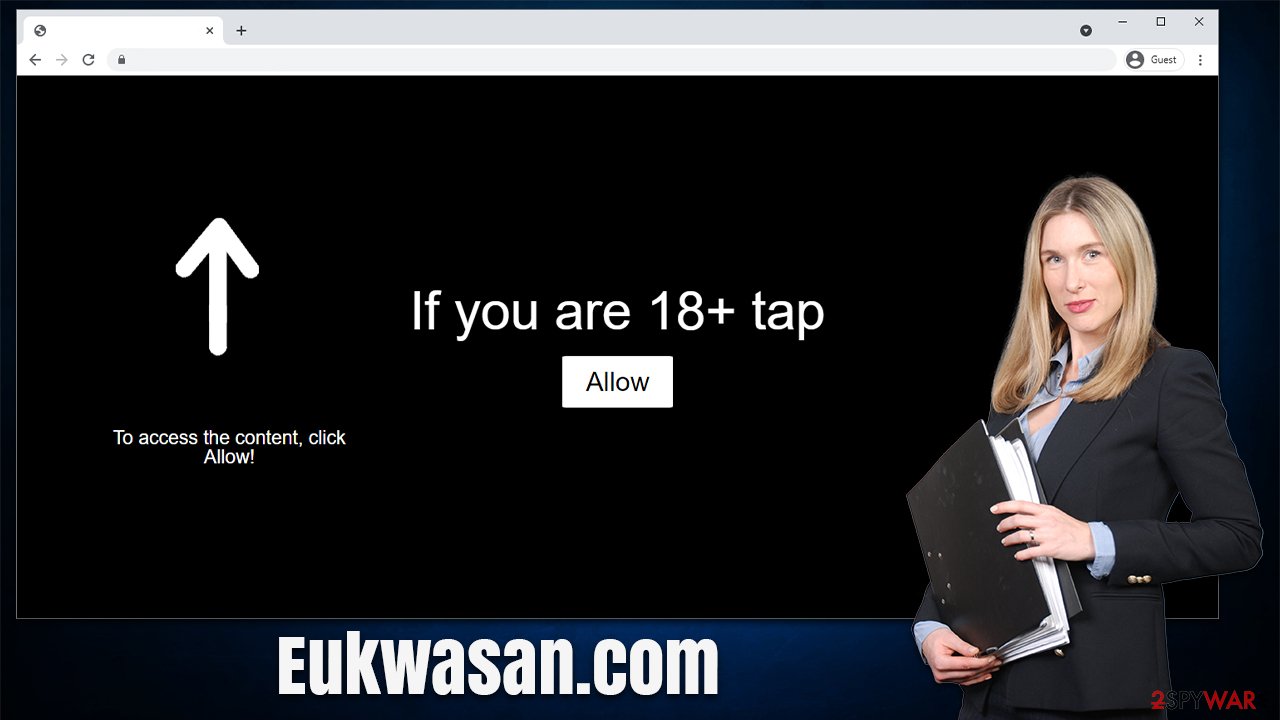
Nothing really happens when either of the buttons is pressed (although users might be redirected to a similar malicious website), so most people do not think much about it and forget the incident completely, only later to find out that their desktops are spammed with intrusive pop-ups. Luckily, removing them is not that difficult within the web browser settings.
How to remove Eukwasan.com pop-ups?
As long as you don't click links within the notification prompts that are shown on a regular basis, your device should be secure. You should never ignore this problem, though, as, even if you are aware that the pop-ups might be dangerous, accidental clicks can happen, as the ads might show up when you expect them the least. Thus, follow the steps below in order top stop the annoying and potentially dangerous prompts from your device.
Google Chrome:
- Open Google Chrome browser and go to Menu > Settings.
- Scroll down and click on Advanced.
- Locate the Privacy and security section and pick Site Settings > Notifications.
- Look at the Allow section and look for a suspicious URL.
- Click the three vertical dots next to it and pick Block. This should remove unwanted notifications from Google Chrome.

Mozilla Firefox:
- Open Mozilla Firefox and go to Menu > Options.
- Click on Privacy & Security section.
- Under Permissions, you should be able to see Notifications. Click the Settings button next to it.
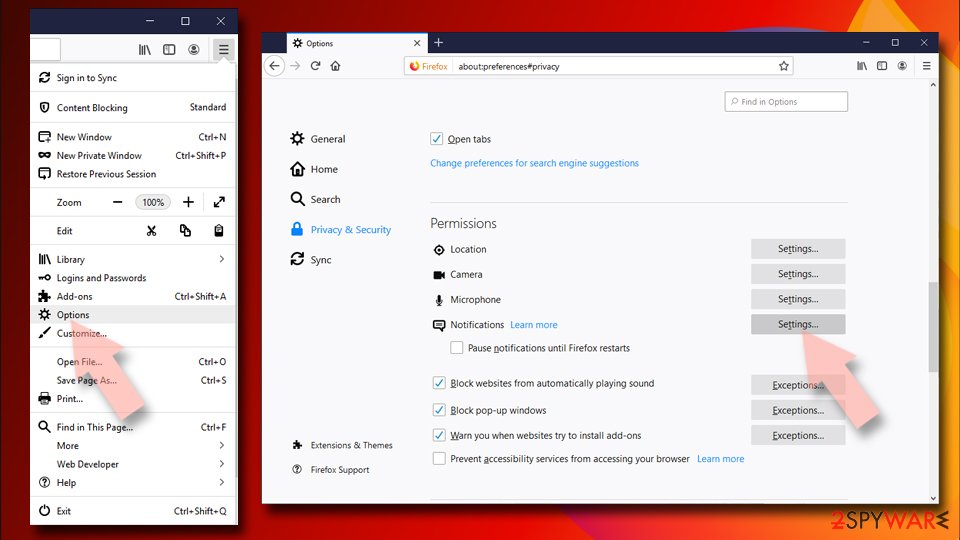
- In the Settings – Notification Permissions window, click on the drop-down menu by the URL in question.
- Select Block and then click on Save Changes. This should remove unwanted notifications from Mozilla Firefox.

Safari:
- Click on Safari > Preferences…
- Go to the Websites tab and, under General, select Notifications.
- Select the web address in question, click the drop-down menu and select Deny.

MS Edge:
- Open Microsoft Edge, and click the Settings and more button (three horizontal dots) at the top-right of the window.
- Select Settings and then go to Advanced.
- Under Website permissions, pick Manage permissions and select the URL in question.
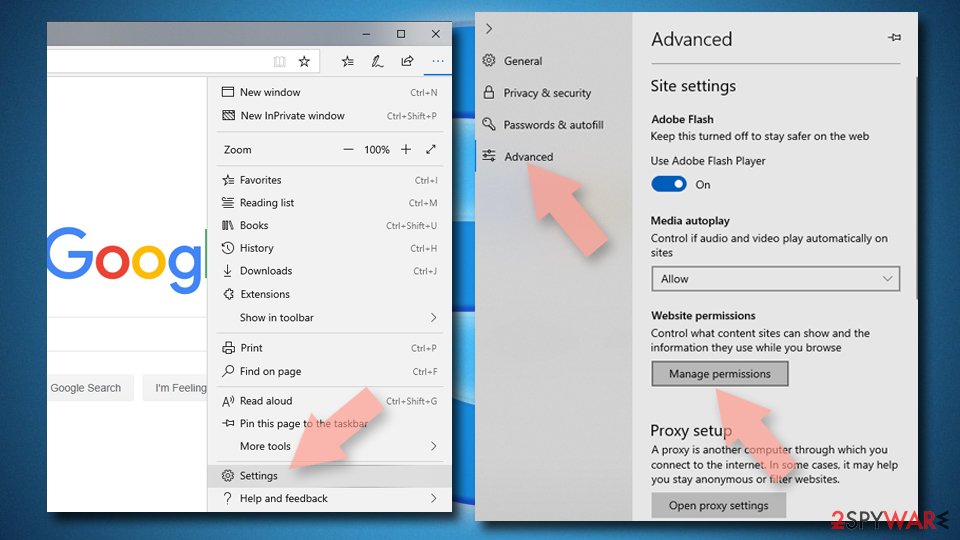
- Toggle the switch to the left to turn notifications off on Microsoft Edge.
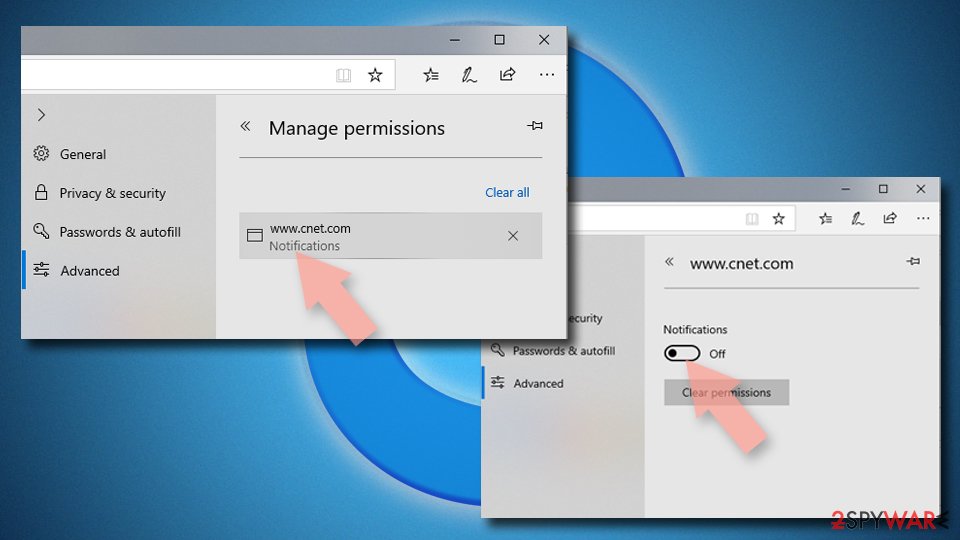
MS Edge (Chromium):
- Open Microsoft Edge, and go to Settings.
- Select Site permissions.
- Go to Notifications on the right.
- Under Allow, you will find the unwanted entry.
- Click on More actions and select Block.

Internet Explorer:
- Open Internet Explorer, and click on the Gear icon at the top-right of the window.
- Select Internet options and go to the Privacy tab.
- In the Pop-up Blocker section, click on Settings.
- Locate web address in question under Allowed sites and pick Remove.

One more step to security
While it is true that Eukwasan.com ads are not directly related to any infections and are a separate issue, we strongly recommend checking your system for adware. Potentially unwanted software is extremely common, and many users are not even aware that they have it installed on their systems.
This happens because adware and other PUPs are commonly spread via deceptive methods, such as software bundling, fake updates, misleading ads, and similar. Besides, some third-party software might be adware in disguise, and one might not be aware of its side effects, such as intrusive ads or browser redirects.
Therefore, we recommend you employ SpyHunter 5Combo Cleaner, Malwarebytes, or another powerful security software, bring it to the latest version and perform a full system scan with it. This would guarantee that no malicious software is installed on your device and your information, files, and computer integrity are intact. Speaking of which, if anti-virus software indeed finds malware or aggressive adware, we also advise using FortectIntego to properly clean browser caches and repair any damage that could have been caused to system files by the infection.
How to prevent from getting adware
Stream videos without limitations, no matter where you are
There are multiple parties that could find out almost anything about you by checking your online activity. While this is highly unlikely, advertisers and tech companies are constantly tracking you online. The first step to privacy should be a secure browser that focuses on tracker reduction to a minimum.
Even if you employ a secure browser, you will not be able to access websites that are restricted due to local government laws or other reasons. In other words, you may not be able to stream Disney+ or US-based Netflix in some countries. To bypass these restrictions, you can employ a powerful Private Internet Access VPN, which provides dedicated servers for torrenting and streaming, not slowing you down in the process.
Data backups are important – recover your lost files
Ransomware is one of the biggest threats to personal data. Once it is executed on a machine, it launches a sophisticated encryption algorithm that locks all your files, although it does not destroy them. The most common misconception is that anti-malware software can return files to their previous states. This is not true, however, and data remains locked after the malicious payload is deleted.
While regular data backups are the only secure method to recover your files after a ransomware attack, tools such as Data Recovery Pro can also be effective and restore at least some of your lost data.
- ^ Get rich quick scams. SRA. Solicitors Regulation Authority.
- ^ Machine learning security: Why security is important in ML. Algorithmia. Blog.
- ^ Ransomware. Wikipedia. The free encyclopedia.
